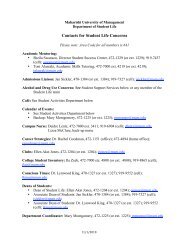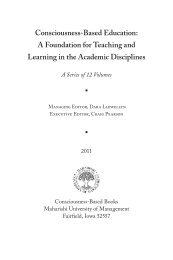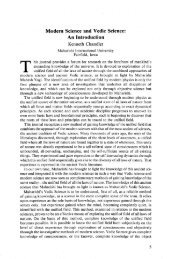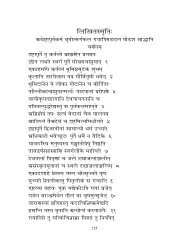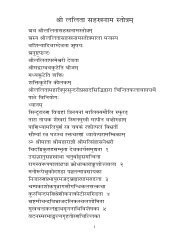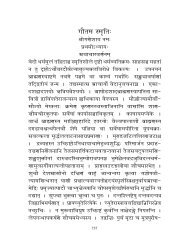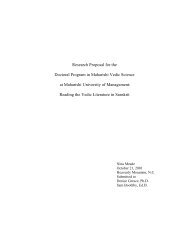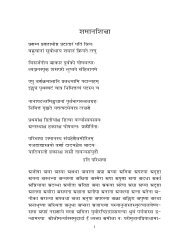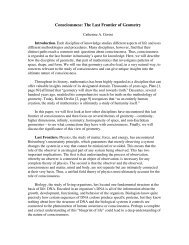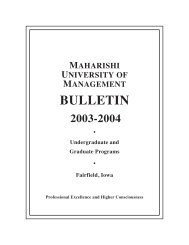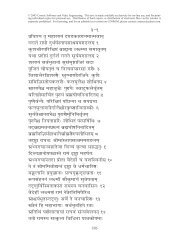The Bhagavad-Gita: A Case Study in Vedic Psychology - Maharishi ...
The Bhagavad-Gita: A Case Study in Vedic Psychology - Maharishi ...
The Bhagavad-Gita: A Case Study in Vedic Psychology - Maharishi ...
You also want an ePaper? Increase the reach of your titles
YUMPU automatically turns print PDFs into web optimized ePapers that Google loves.
MODERN SCIENCE AND VEDIC SCIENCE<br />
After a number of verses <strong>in</strong> Lord Krishna's response to Arjun, <strong>Maharishi</strong> (1967)<br />
comments:<br />
Intellectual understand<strong>in</strong>g of Reality conv<strong>in</strong>ces a man of the existence of a nobler and more<br />
permanent field of life that lies beyond and underlies the ord<strong>in</strong>ary level of phenomenal<br />
existence. That has been the purpose of the discourse up to this po<strong>in</strong>t. Now Lord Krishn<br />
wishes to <strong>in</strong>troduce Arjun to the practice whereby his <strong>in</strong>tellect will become established <strong>in</strong><br />
Reality. This is to give him that positive experience of the truth of existence which will<br />
br<strong>in</strong>g him to a state where he is unaffected by the b<strong>in</strong>d<strong>in</strong>g <strong>in</strong>fluence of action.... just as a<br />
contented bus<strong>in</strong>ess man, hav<strong>in</strong>g achieved great wealth, is not affected by small losses or<br />
ga<strong>in</strong>s. (pp. 116-117)<br />
Lord Krishna's teach<strong>in</strong>g emphasizes that enlightenment is a matter of direct experience<br />
rather than just an <strong>in</strong>tellectual attitude towards life. This po<strong>in</strong>t is also evident from<br />
the fact that Lord Krishn tells Arjun that the thought and behavior of the enlightened<br />
person are completely natural and spontaneously right. Yet at the same time, Lord<br />
Krishna's detailed explanations <strong>in</strong>dicate that <strong>in</strong>tellectual understand<strong>in</strong>g is also necessary<br />
to complete the experience of enlightenment.<br />
Lord Krishna's display of the power of <strong>Vedic</strong> <strong>Psychology</strong> to lead the <strong>in</strong>dividual to<br />
the full development of consciousness is so effective, <strong>Maharishi</strong> observes, that at the<br />
end of this session of two hours, Arjun declares, Smritir labdha, "I have rega<strong>in</strong>ed memory."<br />
<strong>Maharishi</strong> (1980) notes that the word "memory" (smriti) refers to the lively connection<br />
with the totality of natural law: "When the totality of natural law does not disappear<br />
from memory then the <strong>in</strong>dividual is established <strong>in</strong> enlightenment" (p. 16). As<br />
po<strong>in</strong>ted out <strong>in</strong> a previous article <strong>in</strong> this series (Dillbeck, 1988), <strong>Maharishi</strong> <strong>Vedic</strong><br />
<strong>Psychology</strong> states that the unified field of natural law, the Self of each <strong>in</strong>dividual, is<br />
always connected with each of its expressions through a lively self-referral relationship.<br />
(In his commentary, <strong>Maharishi</strong> dist<strong>in</strong>guishes between <strong>in</strong>dividual awareness—the self—<br />
and the field of pure unbounded consciousness—the universal Self.) Thus, the complete<br />
awaken<strong>in</strong>g of the <strong>in</strong>dividual's awareness to the unified field of natural law can be<br />
understood as rega<strong>in</strong><strong>in</strong>g the memory of its unified source and of the dynamics of transformation<br />
through which the field of pure consciousness expresses itself<br />
<strong>The</strong> Teach<strong>in</strong>gs of the <strong>Bhagavad</strong>-<strong>Gita</strong><br />
In describ<strong>in</strong>g the knowledge of the <strong>in</strong>dividual psyche and cosmic psyche given by<br />
Lord Krishn to Arjun, this article draws on <strong>Maharishi</strong>'s translation and commentary on<br />
the <strong>Bhagavad</strong>-<strong>Gita</strong> (1967) as well as some of <strong>Maharishi</strong>'s other works. In order to ga<strong>in</strong><br />
a comprehensive and correct understand<strong>in</strong>g of the <strong>Vedic</strong> texts, it is extremely important<br />
to rely on the commentary of one who has already ga<strong>in</strong>ed the fruit of <strong>Vedic</strong> wisdom,<br />
enlightenment. This age is remarkably fortunate to have <strong>in</strong> <strong>Maharishi</strong> one who embodies<br />
<strong>Vedic</strong> wisdom of the highest state of human consciousness. <strong>Maharishi</strong> is <strong>in</strong> addition<br />
a teacher capable of appreciat<strong>in</strong>g the possible misunderstand<strong>in</strong>gs that can arise <strong>in</strong> the<br />
absence of direct experiential verification of the knowledge <strong>in</strong> the <strong>Vedic</strong> literature. In a<br />
number of places <strong>in</strong> the text that follows, commentary by <strong>Maharishi</strong> is quoted <strong>in</strong> order<br />
to clarify passages cited from the <strong>Bhagavad</strong>-<strong>Gita</strong> and thus to avert possible misunder-<br />
108



